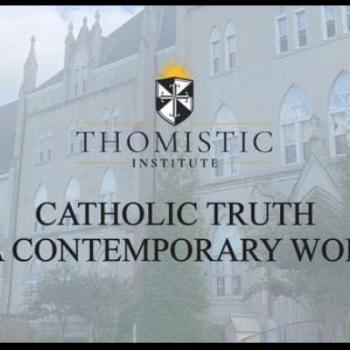Today, August 28, is the Feast Day of St. Augustine of Hippo (AD 354-430). The most influential theologian in the history of Western Christianity, he often is cited by both Catholics and Protestants in support of their respective views on the doctrine of justification. The following is an example of St. Augustine’s brilliance. In these paragraphs, from his On Grace and Free Will (AD 426 or 427), he offers an interpretation of Scripture that, in my judgment, reconciles the apparently contrary passages on grace and reward:
Chapter 18.— Faith Without Good Works is Not Sufficient for Salvation.
Unintelligent persons, however, with regard to the apostle’s statement: We conclude that a man is justified by faith without the works of the law, Romans 3:28 have thought him to mean that faith suffices to a man, even if he lead a bad life, and has no good works. Impossible is it that such a character should be deemed a vessel of election by the apostle, who, after declaring that in Christ Jesus neither circumcision avails anything, nor uncircumcision, Galatians 5:6 adds at once, but faith which works by love. It is such faith which severs God’s faithful from unclean demons—for even these believe and tremble, James 2:19 as the Apostle James says; but they do not do well. Therefore they possess not the faith by which the just man lives—the faith which works by love in such wise, that God recompenses it according to its works with eternal life. But inasmuch as we have even our good works from God, from whom likewise comes our faith and our love, therefore the selfsame great teacher of the Gentiles has designated eternal life itself as His gracious gift. Romans 6:23
Chapter 19 [VIII.]— How is Eternal Life Both a Reward for Service and a Free Gift of Grace?
And hence there arises no small question, which must be solved by the Lord’s gift. If eternal life is rendered to good works, as the Scripture most openly declares: Then He shall reward every man according to his works: Matthew 16:27 how can eternal life be a matter of grace, seeing that grace is not rendered to works, but is given gratuitously, as the apostle himself tells us: To him that works is the reward not reckoned of grace, but of debt; Romans 4:4 and again: There is a remnant saved according to the election of grace; with these words immediately subjoined: And if of grace, then is it no more of works; otherwise grace is no more grace? Romans 11:5-6 How, then, is eternal life by grace, when it is received from works? Does the apostle perchance not say that eternal life is a grace? Nay, he has so called it, with a clearness which none can possibly gainsay. It requires no acute intellect, but only an attentive reader, to discover this. For after saying, The wages of sin is death, he at once added, The grace of God is eternal life through Jesus Christ our Lord. Romans 6:23
Chapter 20.— The Question Answered. Justification is Grace Simply and Entirely, Eternal Life is Reward and Grace.
This question, then, seems to me to be by no means capable of solution, unless we understand that even those good works of ours, which are recompensed with eternal life, belong to the grace of God, because of what is said by the Lord Jesus: Without me you can do nothing. John 15:5 And the apostle himself, after saying, By grace are you saved through faith; and that not of yourselves, it is the gift of God: not of works, lest any man should boast; Ephesians 2:8-9 saw, of course, the possibility that men would think from this statement that good works are not necessary to those who believe, but that faith alone suffices for them; and again, the possibility of men’s boasting of their good works, as if they were of themselves capable of performing them. To meet, therefore, these opinions on both sides, he immediately added, For we are His workmanship, created in Christ Jesus unto good works, which God has before ordained that we should walk in them. Ephesians 2:10 What is the purport of his saying, Not of works, lest any man should boast, while commending the grace of God? And then why does he afterwards, when giving a reason for using such words, say, For we are His workmanship, created in Christ Jesus unto good works? Why, therefore, does it run, Not of works, lest any man should boast? Now, hear and understand. Not of works is spoken of the works which you suppose have their origin in yourself alone; but you have to think of works for which God has moulded (that is, has formed and created) you. For of these he says, We are His workmanship, created in Christ Jesus unto good works. Now he does not here speak of that creation which made us human beings, but of that in reference to which one said who was already in full manhood, Create in me a clean heart, O God; concerning which also the apostle says, Therefore, if any man be in Christ, he is a new creature: old things are passed away; behold, all things have become new. And all things are of God. 2 Corinthians 5:17-18 We are framed, therefore, that is, formed and created, in the good works which we have not ourselves prepared, but God has before ordained that we should walk in them. It follows, then, dearly beloved, beyond all doubt, that as your good life is nothing else than God’s grace, so also the eternal life which is the recompense of a good life is the grace of God; moreover it is given gratuitously, even as that is given gratuitously to which it is given. But that to which it is given is solely and simply grace; this therefore is also that which is given to it, because it is its reward—grace is for grace, as if remuneration for righteousness; in order that it may be true, because it is true, that God shall reward every man according to his works.
Chapter 21 [IX.]— Eternal Life is Grace for Grace.
Perhaps you ask whether we ever read in the Sacred Scriptures of grace for grace. Well you possess the Gospel according to John, which is perfectly clear in its very great light. Here John the Baptist says of Christ: Of His fullness have we all received, even grace for grace. John 1:16 So that out of His fullness we have received, according to our humble measure, our particles of ability as it were for leading good lives— according as God has dealt to every man his measure of faith; Romans 12:3 because every man has his proper gift of God; one after this manner, and another after that. 1 Corinthians 7:7 And this is grace. But, over and above this, we shall also receive grace for grace, when we shall have awarded to us eternal life, of which the apostle said: The grace of God is eternal life through Jesus Christ our Lord, Romans 6:23 having just said that the wages of sin is death. Deservedly did he call it wages, because everlasting death is awarded as its proper due to diabolical service. Now, when it was in his power to say, and rightly to say: But the wages of righteousness is eternal life, he yet preferred to say: The grace of God is eternal life; in order that we may hence understand that God does not, for any merits of our own, but from His own divine compassion, prolong our existence to everlasting life. Even as the Psalmist says to his soul, Who crowns you with mercy and compassion. Well, now, is not a crown given as the reward of good deeds? It is, however, only because He works good works in good men, of whom it is said, It is God which works in you both to will and to do of His good pleasure, Philippians 2:13 that the Psalm has it, as just now quoted: He crowns you with mercy and compassion, since it is through His mercy that we perform the good deeds to which the crown is awarded. It is not, however, to be for a moment supposed, because he said, It is God that works in you both to will and to do of his own good pleasure, that free will is taken away. If this, indeed, had been his meaning, he would not have said just before, Work out your own salvation with fear and trembling. Philippians 2:12 For when the command is given to work, their free will is addressed; and when it is added, with fear and trembling, they are warned against boasting of their good deeds as if they were their own, by attributing to themselves the performance of anything good. It is pretty much as if the apostle had this question put to him: Why did you use the phrase, ‘with fear and trembling’? And as if he answered the inquiry of his examiners by telling them, For it is God which works in you. Because if you fear and tremble, you do not boast of your good works— as if they were your own, since it is God who works within you.
















